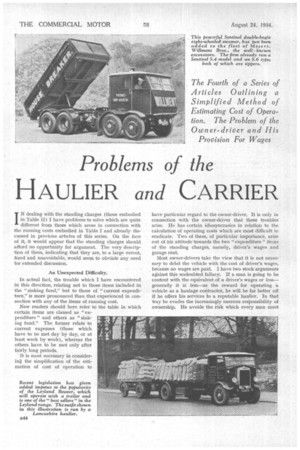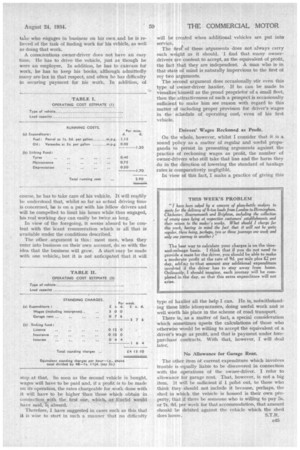Problems of the
Page 58

Page 59

If you've noticed an error in this article please click here to report it so we can fix it.
HAULIER and CARRIER
The Fourth of a Series of Articles Outlining a Simplified Method of Estimating Cost of Operation. The Problem of the Owner-driver and His Provision For Wages
IN dealing with the standing charges (those embodied in Table II) I have problems to solve which are quite different from those which arose in connection with the running costs embodied in Table I and already discussed in previous articles of this series. On the face
of it, it would appear that the standing charges should afford no opportunity for argument. The very descrip tion of them, indicating that they are, to a large extent, fixed and unavoidable, would seem to obviate any need for extended discussion.
An Unexpected Difficulty.
In actual fact, the trouble which I have encountered it this direction, relating not to those items included in the "sinking fund," but to those of "current expenditure," is more pronounced than that experienced in connection with any of the items of running cost.
New readers should here refer to the table in which certain items are classed as " expenditure " and others as " sink ing fund," The former relate to current expenses (those which have to be met day by day, or at least week by week), whereas the others have to be met only after fairly long periods. .
It is most necessary in considering the simplification of the esti mation of cost of operation to have particular regard to the owner-driver. It is only in connection with the owner-driver that these troubles arise. He has certain idiosyncrasies in relation to the calculation of operating costs which are most difficult to eradicate. Two of these, of particular importance, arise out of his attitude towards the two " expenditure " items of the standing charges, namely, driver's wages and garage rent.
Most owner-drivers take the view that it is not necessary to debit the vehicle with the cost of driver's wages, because no wages are paid. I have two stock arguments against this undoubted fallacy. If a man is going to be content with the equivalent of a driver's wages or less— generally it iS less—as the reward for operating a vehicle as a haulage contractor, he will be far better off if he offers his services to a reputable haulier. In that Way he evades the increasingly onerous responsibility of ownership. He avoids the risk which every man must
take who engages in business on his own and he is relieved of the task of finding work for his vehicle, as well as doing that work.
A conscientious owner-driver does not have an easy time. He has to drive the vehicle, just as though he were an employee. In addition, he has to canvass for work, he has to keep his books, although admittedly many are'lax in that respect, and often he has difficulty in securing payment for his work. In addition, of
course, he has to take care of his vehicle. It will readily be understood that, whilst so far as actual driving time is concerned, he is on a par with his fellow drivers and will be compelled to limit his hours while thus engaged, his real working day can easily be twice as long.
In view at the foregoing, it seems absurd to be content with the 'Scant remuneration which is all that is available under the conditions described.
The ofner argument is this : most men, when they enter into business on their own account, do so with the idea that the business will grow. A start may be made with one vehicle,-; but it is not anticipated that it will stop at that. So soon as the second vehicle is bought, wages will have to be paid and. if a profit is to be made on its operation, the rates chargeable for work done with it will have to be higher than those which obtain in connection, with the first one which, as Euclid would have said, TS absurd.
Therefore, I have suggested in cases such as this that it is wise to start in such a manner that no difficulty will be created when additional vehicles are put into service. • The first of these arguments does not always carry such weight as it should. I find that many ownerdrivers are content to accept, as the equivalent of profit, the fact that they are independent. A man who is in that state of mind is naturally impervious to the first of my two arguments.
The second argument does occasionally stir even this type of owner-driver haulier. If he can be made to visualize himself as the proud proprietor of a small fleet, then the attractiveness of such a prospect is occasionally sufficient to make him see reason with regard to this matter of including proper provision for driver's wages in the schedule of operating cost, even of his first vehicle.
Drivers' Wages Reckoned as Profit.
On the whole, however, whilst I consider that it is a sound policy as a matter of regular and useful propaganda to persist in presenting arguments against the practice of reckoning wages as profit, the number of owner-drivers who still take that line and the harm they do in the direction of lowering the standard of haulage rates is comparatively negligible.
In view of this fact, I make a practice of giving this type of haulier all the help I can. He is, notwithstanding these little idiosyncrasies, doing useful work and is well worth his place in the scheme of road transport.
There is, as a matter of fact, a special consideration which sometimes upsets the calculations of those who otherwise would be willing to accept the equivalent of a. driver's wage as profit, and that is payment under hirepurchase contracts. With that, however, I will deal later.
No Allowance for Garage Rent.
The other item of current expenditure which involves trouble is equally liable to be discovered in connection with the operations of the owner-driver. I refer to allowance for garage rent. That, however, is not a big item. It will be sufficient if I point out, to those who think they .should not include it because, perhaps, the shed in which the vehicle is housed is their own property, that if there be someone who is willing to pay 5s. or 7s. 6d. per week for that accommodation, that amount should be debited against the vehicle which the shed
does house. S.T.R.




























































































